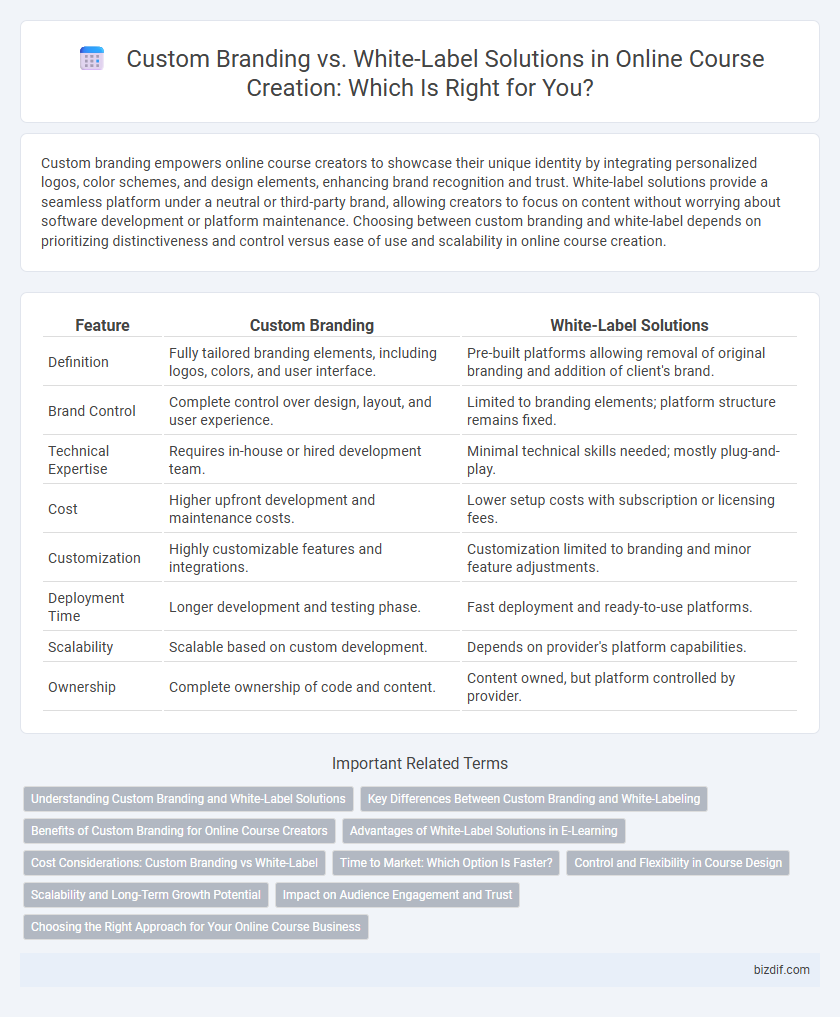Custom branding empowers online course creators to showcase their unique identity by integrating personalized logos, color schemes, and design elements, enhancing brand recognition and trust. White-label solutions provide a seamless platform under a neutral or third-party brand, allowing creators to focus on content without worrying about software development or platform maintenance. Choosing between custom branding and white-label depends on prioritizing distinctiveness and control versus ease of use and scalability in online course creation.
Table of Comparison
| Feature | Custom Branding | White-Label Solutions |
|---|---|---|
| Definition | Fully tailored branding elements, including logos, colors, and user interface. | Pre-built platforms allowing removal of original branding and addition of client's brand. |
| Brand Control | Complete control over design, layout, and user experience. | Limited to branding elements; platform structure remains fixed. |
| Technical Expertise | Requires in-house or hired development team. | Minimal technical skills needed; mostly plug-and-play. |
| Cost | Higher upfront development and maintenance costs. | Lower setup costs with subscription or licensing fees. |
| Customization | Highly customizable features and integrations. | Customization limited to branding and minor feature adjustments. |
| Deployment Time | Longer development and testing phase. | Fast deployment and ready-to-use platforms. |
| Scalability | Scalable based on custom development. | Depends on provider's platform capabilities. |
| Ownership | Complete ownership of code and content. | Content owned, but platform controlled by provider. |
Understanding Custom Branding and White-Label Solutions
Custom branding in online course creation involves designing a unique visual identity that reflects the creator's personal or company brand, including logos, color schemes, and typography, enhancing brand recognition and consistency. White-label solutions provide a ready-made platform that can be rebranded with custom logos and colors, allowing course creators to present a professional appearance without developing the platform from scratch. Understanding the distinction helps educators and businesses choose between tailored brand identity control and efficient deployment of established e-learning technology.
Key Differences Between Custom Branding and White-Labeling
Custom branding allows businesses to design and implement unique logos, colors, and user interfaces tailored specifically to their identity, enhancing brand recognition and customer loyalty. White-label solutions provide a ready-made product or platform that companies can rebrand and resell as their own, offering faster deployment but limited customization options. The key differences lie in the level of customization, control over the user experience, and the time required for implementation, with custom branding demanding more development effort and white-labeling focusing on speed and simplicity.
Benefits of Custom Branding for Online Course Creators
Custom branding empowers online course creators to establish a unique identity by tailoring logos, colors, and design to reflect their brand ethos, fostering stronger trust and recognition among learners. This personalized approach enhances user experience and loyalty, driving higher engagement and course completion rates. Unlike white-label solutions, custom branding offers greater flexibility in marketing strategies and scalability for future product expansions.
Advantages of White-Label Solutions in E-Learning
White-label solutions in e-learning offer seamless customization allowing educators to present courses under their own brand, enhancing credibility and trust with learners. These platforms provide ready-made infrastructure, saving time and reducing technical complexity compared to building from scratch. Scalability and integration with existing systems are streamlined, supporting consistent user experience and brand recognition across all learning materials.
Cost Considerations: Custom Branding vs White-Label
Custom branding often involves higher upfront costs due to design, development, and ongoing maintenance fees, making it suitable for businesses seeking full control over their online course platform's appearance. White-label solutions typically offer lower initial investments by providing ready-made templates with minimal customization, reducing expenses while still allowing course creators to present their brand. Choosing between custom branding and white-label options depends on budget constraints and the desired level of personalization for the course delivery environment.
Time to Market: Which Option Is Faster?
Custom branding often requires more time to develop unique assets and integrate personalized features, extending the time to market. White-label solutions provide pre-built platforms that can be quickly rebranded, significantly accelerating launch timelines. For rapid deployment, white-label options are typically faster, making them ideal for businesses prioritizing speed over full customization.
Control and Flexibility in Course Design
Custom branding offers course creators full control over visual identity, enabling tailored logos, color schemes, and user interface elements that align with their brand strategy. White-label solutions provide flexibility by removing third-party branding, but often limit customization options, restricting extent of design and feature adjustments. For maximum control and flexibility in course design, custom branding is preferred, ensuring a unique and cohesive learner experience.
Scalability and Long-Term Growth Potential
Custom branding offers scalable growth by allowing businesses to build a unique, recognizable identity that fosters customer loyalty and long-term engagement. White-label solutions enable rapid deployment and easy scaling through pre-built frameworks but may limit differentiation and brand equity development over time. Prioritizing custom branding supports sustainable growth and market expansion by creating a distinct brand presence adaptable to evolving business needs.
Impact on Audience Engagement and Trust
Custom branding in online course creation boosts audience engagement by providing a consistent and recognizable identity that fosters trust and loyalty. White-label solutions enable seamless integration of course platforms under a client's brand, enhancing credibility and professional appearance without revealing third-party providers. Both approaches significantly influence user perception, but custom branding offers stronger emotional connections that drive long-term student commitment.
Choosing the Right Approach for Your Online Course Business
Custom branding empowers online course creators to establish a unique identity by integrating personalized logos, colors, and messaging, enhancing brand recognition and customer loyalty. White-label solutions offer the advantage of scalability and quick deployment by allowing course providers to rebrand existing platforms without investing in development. Selecting the right approach depends on factors like budget, desired level of control, and long-term business goals to ensure a seamless brand experience for learners.
Custom branding vs White-label solutions Infographic

 bizdif.com
bizdif.com